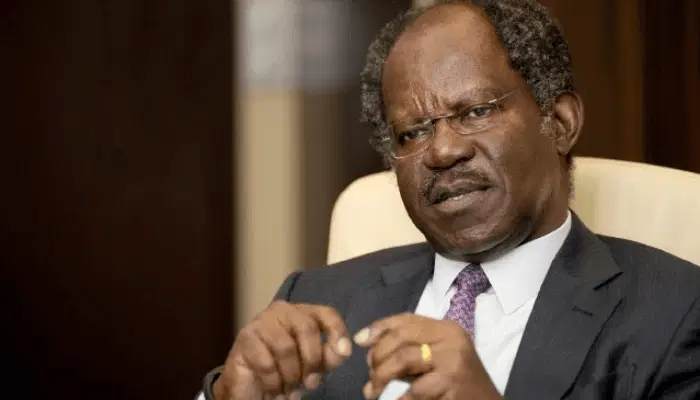Headline
Top 5 Richest African Immigrants In US

The US is a country built on ambition and enterprise. Despite this, a handful of African immigrants have not only found their footing, but they’ve thrived.
Navigating the fast-paced, often unforgiving terrain of American capitalism, these individuals turned bold dreams into billion-dollar realities. From humble beginnings in places like Pretoria, Lagos and Alexandria, they stepped into industries like tech, medicine, entertainment and finance, fields that demand not just talent, but grit, resilience and a deep belief in one’s vision. Their stories are more than just financial success; they’re powerful testaments to what’s possible when opportunity meets determination.
These five remarkable men are among the richest African immigrants in the US today and their journeys continue to inspire across continents.
1. Elon Musk – $393.1 billion (South Africa)
READ ALSO:Elon Musk Calls For US Exit From NATO
Elon Musk stands at the pinnacle of global wealth as the richest African immigrant in the United States and the world. Born in Pretoria, South Africa, Musk moved to the US via Canada and went on to revolutionise transportation, energy and space exploration.
As CEO of Tesla and SpaceX, his ventures have redefined electric vehicles and private spaceflight. With a net worth of $393.1 billion, Musk’s vision extends from Earth to Mars, placing him leagues ahead in both ambition and fortune.
2. Patrick Soon-Shiong – $5.6 billion (South Africa)
South African-born Dr. Patrick Soon-Shiong made his billions in medicine and biotechnology. A former surgeon, he developed the breakthrough cancer drug Abraxane and built two major pharmaceutical companies. Now based in Los Angeles, he runs NantWorks, a healthcare innovation hub, and owns The Los Angeles Times. With a net worth of $5.6 billion, Soon-Shiong is not only a medical pioneer but also a key player in media and technology in the US. He is now the 34th richest man in the world.
3. Rodney Sacks & Family – $3.6 billion (South Africa)
READ ALSO:Elon Musk Calls For US Exit From NATO
Rodney Sacks, originally a lawyer in South Africa, moved to the US and built Monster Beverage into a global giant in the energy drink market. That brought him up the list of world billionaires (54th). Co-founding the company in the 1990s, he helped turn Monster into a pop culture phenomenon through sponsorships in extreme sports, music, and gaming. Today, with a net worth of $3.6 billion, Sacks is among the top African-born business magnates shaping consumer tastes in America.
4. Haim Saban – $3.1 billion (Egypt)
Egyptian-born Haim Saban became a media powerhouse after moving to the US and creating the Power Rangers franchise. A veteran of the television and entertainment industry, Saban is also a savvy investor and philanthropist. He stands tall at 61st in the world billionaire ranking. His influence spans children’s programming, political advocacy and major media investments—including a past controlling interest in Univision. With $3.1 billion to his name, Saban remains one of the most successful African-born figures in Hollywood and beyond.
5. Adebayo “Bayo” Ogunlesi – $2.4 billion (Nigeria)
Nigerian-born Adebayo Ogunlesi is a towering figure in global finance. As the chairman and managing partner of Global Infrastructure Partners (GIP), he oversees investments in some of the world’s busiest airports and critical infrastructure. A Harvard-trained lawyer and banker, Ogunlesi has led high-stakes deals across continents. With a net worth of $2.4 billion, he stands as a symbol of African excellence in Wall Street’s upper echelons. He ranks 77th among the world’s billionaires.
Headline
Insecurity: US Congressman Riley Moore Reveals Trump’s Mission In Nigeria

US Congressman Riley Moore has dismissed insinuations that President Donald Trump is attempting to bring war to Nigeria.
Moore made the remark in a post on his verified X handle on Monday.
His comments followed a US military airstrike on a terrorist enclave in north-west Nigeria on Christmas Day, reportedly carried out on the directive of President Trump.
“President Trump is not trying to bring war to Nigeria, he’s bringing peace and security to Nigeria and to the thousands of Christians who face horrific violence and death.
READ ALSO:Russia Calls up 135,000 Military Personnel
“The strikes against ISIS on Christmas, in coordination with the Nigerian government, have given hope to the Christians in Nigeria,” he said.
Recall that the lawmaker had previously stated that President Trump is focused on ending the killing of Christians in Nigeria.
It will be recalled that Moore led a US delegation on a fact-finding mission into alleged Christian genocide in Nigeria some weeks ago.
During his brief stay in the country, Moore travelled to Benue State, where he interfaced with religious and traditional leaders, as well as internally displaced persons.
Headline
Russia Calls up 135,000 Military Personnel

Russia has enlisted 135,000 conscripts for military service in 2026, following the conclusion of the autumn army draft by the Defense Ministry.
A statement on Monday said most personnel have been assigned to training units and military formations where they will “get a military specialty and learn to operate modern military hardware.”
The conscripts can choose to serve in any of the various military branches and armed services after an assessment of their health condition and the results of psychological examinations.
READ ALSO:Russian Strike On Odesa Region Kills Eight, Injures 27
The ministry disclosed that 680 recruits have joined scientific and research-production units, while 240 from the country’s national teams in Olympic disciplines joined sports companies.
However, military personnel who have served the established term of military service have been discharged and sent to their places of residence.
The latest enlistment confirms Russia is shoring up its troops deployed to the ongoing special military operation in Ukraine ahead of the new year.
READ ALSO:Putin Says Russia Ready For War, Blames Europe For Sabotaging Peace
A fortnight ago, European leaders reaffirmed their pledge to form a multinational force–under the aegis of the Coalition of the Willing–to assist Ukraine in securing land, skies, and seas.
The pledge is one of the six commitments the EU and heads of state developed for Ukraine’s security and economic recovery support measures.
In an interview with TASS on Sunday, Russian Foreign Minister Sergey Lavrov condemned Europe’s insistence on sending military forces to Ukraine.
“We have said many times that our Armed Forces would view them as a legitimate target,” he said, warning that anyone who attacks Russia would face “a devastating blow.”
Headline
How Our Airstrikes Stopped Christmas Attacks In Nigeria — US Lawmaker

Riley Moore, a member of the United States House of Representatives from West Virginia’s 2nd District, has linked the absence of Christmas attacks in Nigeria this year to US military airstrikes carried out against Islamist militants on Christmas Day.
In a post on his official X account on Saturday, Moore contrasted the situation with the past two Christmas seasons, during which he claimed Christians were killed in attacks across parts of Nigeria.
The lawmaker noted that this year’s response targeted extremist groups instead of marking another period of violence.
READ ALSO:Rep Moore Confirms 12 Tomahawk Missiles Launched In Sokoto
He added that US forces acted decisively against militants in coordination with the Nigerian government.
“For the past two Christmases, Christians have been murdered in Nigeria. This year, thanks to @POTUS, Radical Islamic Terrorists were on the receiving end of 12 Tomahawk missiles as a present.
“The successful strikes on ISIS, in coordination with the Nigerian government, are just the first step to secure the country and end the slaughter of our brothers and sisters in Christ,” Moore wrote.
US President Donald Trump said on Thursday that American forces had conducted deadly strikes against Islamic State terrorists in north-western Nigeria.
Trump, who spoke via his Truth Social platform, warned that more attacks would follow if the militants continued killing Christians, adding that the Department of War executed numerous “perfect strikes.”

 Headline4 days ago
Headline4 days agoJUST IN: US Forces Bomb Terrorists Camps In Nigeria

 News5 days ago
News5 days agoOkpebholo Slams ₦25bn Libel Suit On Edo PDP Chairman

 Headline4 days ago
Headline4 days agoUS Dept Of War Shares Video Of Air Strikes In Nigeria

 News4 days ago
News4 days agoPHOTOS: SGF George Akume Weds Ooni’s Ex-Queen

 News1 day ago
News1 day agoBREAKING: Anthony Joshua Involved In Road Accident

 News4 days ago
News4 days agoTrump’s Airstrikes: Halt Military Cooperation With US Immediately – Sheikh Gumi Tells Tinubu Govt

 News4 days ago
News4 days agoShehu Sani Reacts To Trump’s Military Strikes In Nigeria

 Headline4 days ago
Headline4 days agoU.S. Lawmaker Reacts To Nigeria, U.S. Airstrikes

 News2 days ago
News2 days agoEx-Edo Gov Obaseki Reacts As His Cousin Is Beaten, Stripped

 Metro2 days ago
Metro2 days agoObaseki Beaten, Stripped In Edo


























